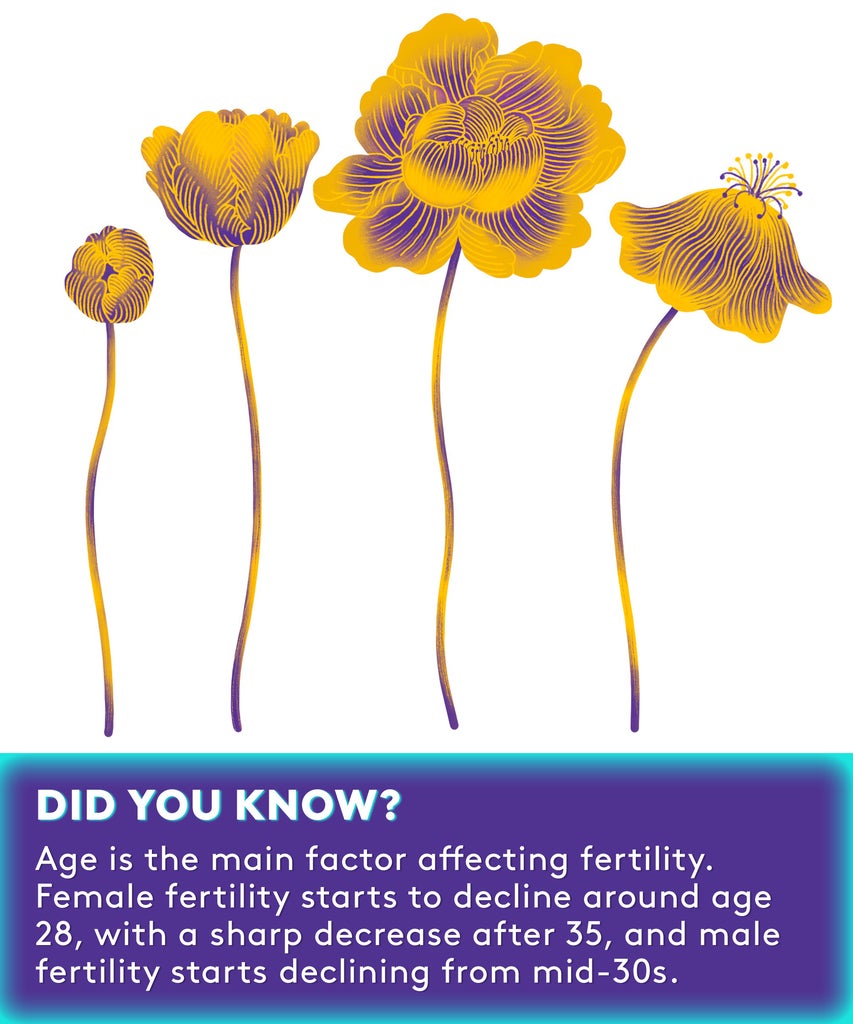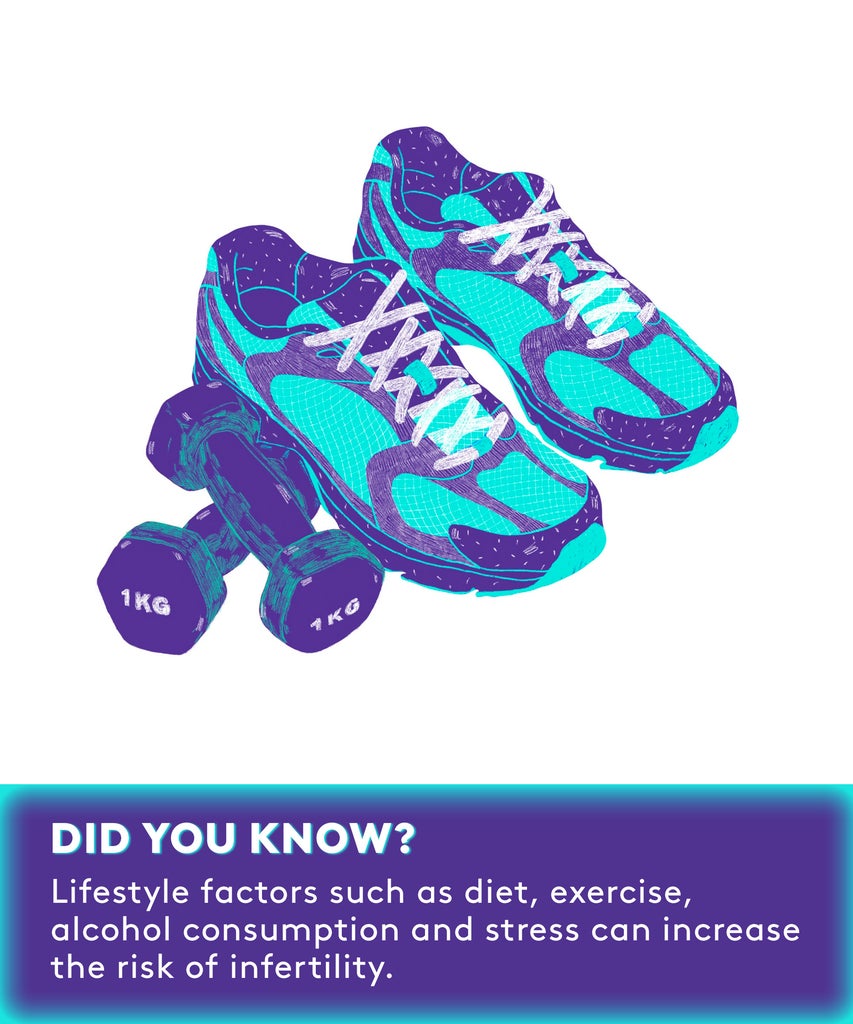The content and development of this article has had scientific input and editorial review from Merck Serono Ltd and Fertility Network UK. This article is sponsored by Merck Serono Ltd.
When you’re just finding your feet as an adult, fertility might not be high on your agenda, or even on your radar. Maybe you’ve tidied the topic away in a mental box, ready to be opened in a few years’ time.
If you do see having kids in your future, it can be helpful to get clued up earlier rather than later. Around one in six people will have challenges with fertility, and there are many possible causes, including a lack of regular ovulation, poor quality semen, blocked or damaged fallopian tubes or endometriosis. There are also risk factors that may affect fertility. Age and lifestyle are some of the main factors that affect it — fertility declines with age, and lifestyle factors like our weight, smoking, alcohol intake (and more) can have a huge impact. This doesn’t mean you need to overhaul your lifestyle and stop doing things you enjoy, but it helps to have the right information now to allow you to make informed decisions.
Naomi*, 29, has been with her male partner for 11 years and married for two of them. They always knew they wanted children together and while her husband was ready a few years into their relationship, she wasn’t.
People often associate fertility with female health, but male factors account for up to 50% of fertility issues. Sometimes both partners can have problems with their fertility, or the cause may be unknown.
After four years of fertility challenges (they each had their own struggles), lifestyle changes, countless tests, appointments, tears, arguments, and one round of IVF, Naomi is currently waiting to give birth to the couple’s first child. Here, she reflects on her journey to motherhood and delves into what she wishes she’d known earlier about fertility, and why.
This is just one couple’s experience — everyone’s fertility journey is different and what works for one person or couple might not work for you. IVF (in vitro fertilisation) and ICSI (intra-cytoplasmic sperm injection) was the way forward for Naomi and her husband, but it won’t necessarily be for everyone.
The important thing is that you feel in control of your own fertility. Check out Fertility Network UK for more information about fertility, and the common causes of fertility challenges. It can be also useful to find out more about your own fertility from a medical professional to give you the freedom to make choices about your future.
As a teenager, I wasn’t really thinking about fertility or wanting to get pregnant and start a family. If anything, it was about practising safe sex and finding a contraceptive pill that worked for me.
I didn’t know that some people struggled with their fertility. We’re brought up and taught in school to always wear protection, otherwise you’d fall pregnant instantly. I never knew it could be challenging for some couples to get pregnant. I just knew I wanted to have a baby at the same time my mum did, at about 26.
In my early twenties, I was so focused on my career that fertility still wasn’t really on my mind. I always thought, “I’ll get pregnant when I don’t use protection,” and that was it.
I did have quite bad periods when I was younger and when I went for testing, I was told I had polycystic ovary syndrome (PCOS). This did make me a bit anxious about my future fertility, but I was told not to worry about it until the time came.

It was when I hit my mid twenties that I started to really think about my fertility. I began reading stories about women who were struggling to get pregnant, and worrying about my periods and how contraceptives were affecting my body.
I knew I wasn’t ready to have a baby yet — I wanted to focus on my career before I became a mum. But when my partner and I got engaged in 2017, we decided to stop using contraception. Our approach was “If it happens, it happens.”
Months and years went by and we didn’t even have a pregnancy scare. This is when I started to question what was wrong with me and my fertility.
We carried on with this approach until 2021 — the year we got married — and it was at this point we decided to focus on ovulation predictor kits, basal body temperature, ovulation tracking; you name it, we did it and still, nothing. Everyone dreams of falling pregnant on their honeymoon, but this wasn’t the case for us.
At this point, we approached doctors to find out what was going on. I found out I didn’t have PCOS, but I did have low progesterone levels and wasn’t ovulating every month. I started taking a drug to induce ovulation, which worked, but then I was ovulating and still not falling pregnant.
There’s so much pressure on women to conceive and people don’t think about the male factors at play
It was then that my husband, who’s the same age as me, got his fertility tested. We found out he had a low sperm count and our only way of conceiving was through IVF with ICSI, where sperm is injected directly into the egg.
Finding out he had a low sperm count really knocked him and made him feel unmasculine and ashamed. It also highlighted to us both that men have fertility challenges as well as women. We’re not taught these things and male fertility is rarely discussed. It’s always, “Do you get a period? If so, then you can get pregnant.”
There’s so much pressure on women to conceive and people don’t think about the male factors at play. People in our lives assumed I was the only one with fertility challenges. Our journey has shown our families that it’s not just women who struggle with their fertility.
I wish I’d known earlier that you don’t inevitably just get pregnant when you don’t use protection. It’s a process and for some people it doesn’t happen overnight.
I knew that a woman’s ovarian reserve decreases as she gets older, but I always knew I wanted to reach a certain point in my career before having a baby. I just assumed I wouldn’t have issues with getting pregnant when I wanted to have a baby in my late twenties.
I know now that every woman is different. While age is the main factor affecting ovarian reserve, lifestyle factors also have a huge impact on fertility.

Before I started trying to get pregnant, I didn’t know how much things like diet, exercise, smoking and drinking, affect fertility. We tried everything to give us the best chance of getting pregnant naturally, including cutting out alcohol and caffeine, eating healthily, exercising, my husband quit vaping, and we started taking supplements and conception vitamins.**
My husband also stopped wearing tight boxers and avoided saunas and hot tubs, which can affect sperm, and took every decision he could to make a positive impact on his fertility.
After countless tests, appointments, tears and arguments, we finally started the referral process and a long wait to start IVF. On the day of our egg collection, my husband’s sperm count had gone up by 10% and his sperm motility (the ability of sperm to move efficiently) by 45% which, although still low, was a huge improvement.
We started IVF in March this year and were extremely lucky to fall pregnant with our baby boy on our first round. He’s due to arrive very soon.
What surprised me most during this process was the strength of my relationship with my husband. I can’t put into words the impact of fertility challenges on a relationship. Our relationship is now the strongest it’s ever been. At points we thought this would break us, but we stuck together.
We both went through phases of thinking “I’m the problem,” so we both had to confide in one another and I became very protective of my husband because this wasn’t his fault. Low sperm counts are common, we just didn’t know it until we found ourselves in this situation ourselves.
Fertility isn’t spoken about openly because it’s so personal and no one knows about the trouble it can cause until they’re in it themselves
It also affected our friendships. We didn’t want to be around anyone who was pregnant or had kids because it broke our hearts. To this day, not everyone knows what we went through because we have some healing to do before we can speak widely about it. I think that will happen when our baby boy is here.
We’re not ashamed of our journey, but it took a toll and it’s not something we’re ready to fully tell people about yet.
I wish more young people knew that getting pregnant isn’t easy for everyone. Obviously, we all should use protection when we don’t want to get pregnant, but be aware that when you do want to have a baby, it’s not guaranteed you’ll fall pregnant instantly.
If I’d known more about fertility at a younger age, I would have looked into our reproductive status before starting the process of trying to get pregnant. This would have helped our mindset, as we wouldn’t have gone into the process blind and wondering.
There’s still a stigma around fertility issues because everyone wants to showcase a picture-perfect life to others. Social media has made us this way. But behind closed doors people are struggling with the heartache of not falling pregnant.
Fertility isn’t spoken about openly because it’s so personal and no one knows about the trouble it can cause until they’re in it themselves.
Reflecting on my own years-long journey, as someone who’s about to give birth, I think fertility is very much taken for granted. Those who are lucky enough not to have problems can be oblivious to the heartache, upset and stress that goes on behind closed doors. If you don’t have to go through fertility struggles, you are truly blessed.
Remember, this is just one couple’s unique fertility journey, and their personal reflection on it. Everyone’s situation is different and what worked for Naomi and her husband might not work for others.
What matters is that you’re clued up with the facts about fertility, so you have the freedom to make your own informed decisions in your own time.
Infertility is when a couple cannot get pregnant despite having regular unprotected sex. For the UK, infertility is usually only diagnosed when a couple have not managed to conceive after a year of trying.
Contact your doctor if you have concerns about your personal situation, and head to Fertility Network UK for more information about fertility, and the common causes of fertility challenges.
*We’ve changed her name.
**These are not the only factors which can influence fertility.
UI-NONF-00954, date of prep November 2023
Like what you see? How about some more R29 goodness, right here?